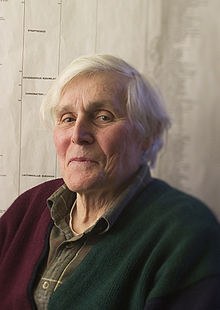Microbial Genomics: Standing on the Shoulders of Giants
Professor Carl Woese

[Picture credit: Don Hamerman – Institute for Genomic Biology, University of Illinois at Urbana-Champaign.]
W. Ford Doolittle shares his thoughts on Carl Woese and why he sees him as a giant
It's important to be honest about our heroes. Carl Woese is one of mine, more influential in my own work and thinking, perhaps, than even the extraordinary research mentors/supervisors I had as a student and postdoc. And he left indelible marks on microbiology, universal phylogeny and molecular ecology. Certainly he was the most influential microbiologist of the later half of the last century, if we discount those who used microbes to elaborate molecular biology’s central dogma as "real microbiologists". But the myth that has built up around Carl, and was not discouraged by him – that he was "microbiology’s scarred revolutionary", a shunned pariah labouring away in his lonely lab, the victim of scientific bullying by the giants who shrugged him off their own shoulders (Mayr, Margulis and Stanier) – undervalues Carl's achievement and fosters a simplistic notion of how science works. Unsung hero stories are what the media love best, and we shouldn’t encourage them. Most radical ideas are slow to gain acceptance, and should be. We want our scientific community to be sceptical about extraordinary claims such as Carl's – that some bacteria were, in spite of all (well, most) previous evidence, not bacteria at all. In fact, his initial claim was quite quickly published in the Proceedings of the US National Academy of Sciences – 11 years before he himself was elected to membership - and made the cover of the New York Times. Within three years, Carl was writing feature articles in Science about Archaea and how he discovered them. That he did not get a Nobel Prize can be attributed to the fact that Alfred Nobel neglected biology (as opposed to biomedicine). The Crafoord Prize Carl did receive in 2003 is the Royal Swedish Academy’s way of making up for that neglect.
Nor was Carl so lonely in his lab. George Fox, who was his postdoc, deserves equal billing for the recognition that Archaea were something new. Mitch Sogin, a graduate student, went on to pioneer the phylogenetic exploration of eukaryotes, vastly expanding our appreciation of their diversity. And it is to Norm Pace, a long-time friend of Carl's and himself the mentor of an extraordinary cadre of microbiological innovators, that we owe the revolution in ecology based on the amplification of genes for rRNA. If we are to judge our giants by the giants in turn standing on their shoulders, Carl was a colossus.
We should not, I think, pin Carl's legacy so firmly to the discovery of the Archaea. It was his courage and fortitude in developing rRNA as a 'molecular chronometer', the first and still best molecular marker for uniting all of Life, that was extraordinary. The discovery of a deep division among what were then just called 'bacteria' followed automatically. And the three-domain Tree of Life now enshrined in all the textbooks and often taken as Carl's crowning conceptual achievement, just may not last. Archaea are looking more and more like a paraphyletic domain from which eukaryotes emerge. Unless we want to give the latter domain status because of their 'degree of difference', thus retroactively strengthening Ernst Mayr’s position in his 1998 attack on Carl, three-domain defenders will have to loosen up. Carl had a t-shirt given to him, I believe, by Wolfram Zillig, which declared him the 'Archaekoenig'. He was that, and history will rightly honour him. Simplistic hagiographies do him and his work a disservice.
